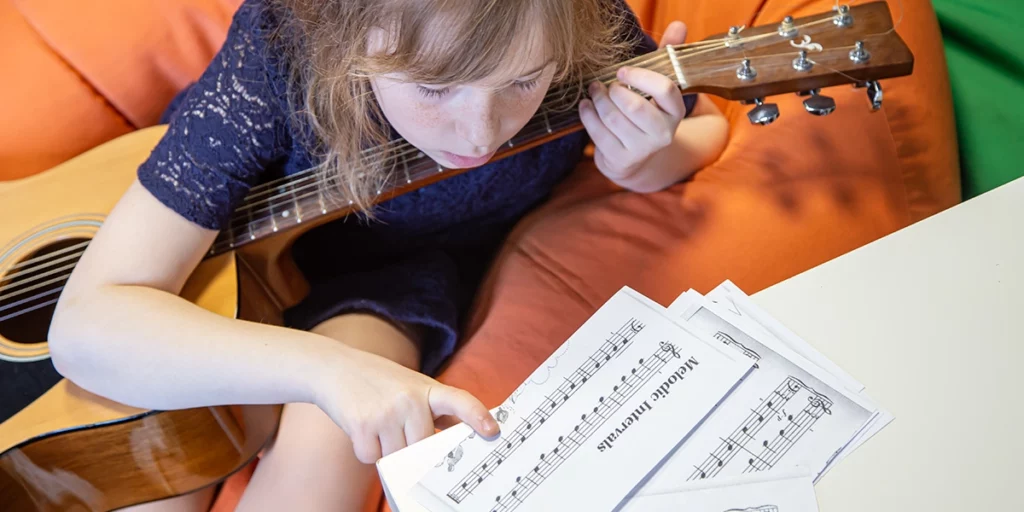Musical intelligence is a unique form of intelligence that is often overlooked in traditional education systems. However, it’s an essential part of human development, as it enhances cognitive, emotional, and social skills. Some children have a natural inclination towards music, while others may need a little help to develop their musical intelligence. In this blog post, we will explore the signs of a musically intelligent child and provide strategies to help parents and educators nurture this unique form of intelligence.
Download and Start Your Free Trial of the Safes Parental Control App
Understanding Musical Intelligence
Musical intelligence, also known as musicality, is the ability to understand, create, and appreciate music. People with musical intelligence possess a unique set of characteristics that enable them to excel in musical activities. These characteristics include a keen sense of rhythm, an ear for melody, and the ability to distinguish pitch variations. Rhythm is the foundation of music and refers to the pattern of sounds and silences in a piece of music. Melody is the sequence of notes that make up a musical phrase, while pitch refers to the highness or lowness of a sound.
Other aspects of musical intelligence include the ability to recognize and understand complex musical patterns and structures, as well as the emotional and social impact of music. People with musical intelligence often have a strong sense of creativity and are able to express themselves through music in unique and meaningful ways.
Other articles related to children’s intelligence:
- Why Nurturing Linguistic Intelligence in Children is Important
- Examples of Spatial Intelligence That Benefits Your Child
- Screen Time or STEM Time: Logical-Mathematical Intelligence in the Digital Age
Signs of Musical Intelligence in Children
Musical intelligence can manifest in children in various ways. Early signs of musical intelligence include an interest in music, the ability to recognize melodies and a natural sense of rhythm. Children with musical intelligence may enjoy listening to music, singing along to songs, and dancing to the beat. As they grow older, they may show an interest in playing an instrument, singing, or composing music. They may also have a strong memory for music and be able to recall songs after hearing them only a few times.

Children with musical intelligence often express themselves through music in unique and creative ways. For example, they may write their own songs, create new arrangements of existing songs, or improvise melodies on the spot. They may also use music to express their emotions, such as performing a sad song when they are feeling down or a happy tune when they are excited. Additionally, children with musical intelligence may collaborate with others to create music, such as forming a band or performing in a choir.
| Summary:
Musical intelligence can be recognized in children through early signs such as an interest in music and the ability to recognize melodies. As they grow older, children with musical intelligence may develop skills such as playing an instrument and composing music. They express themselves through music in many ways, including creating their own songs and collaborating with others to make music. |
How to Develop Musical Intelligence in Children
As a parent, you can help develop your child’s musical rhythmic intelligence in many ways. One of the most important things you can do is to expose your child to a variety of musical genres. This will help them develop an appreciation for different types of music and expand their musical horizons. You can also provide your child with opportunities to practice music, such as taking music lessons or joining a school band or choir. Encourage your child to experiment with different instruments and styles of music to find what they enjoy most.
Developing musical rhythmic intelligence can have many benefits for your child. Studies have shown that exposure to music and musical training can improve cognitive development, including language skills, spatial-temporal skills, and memory. Learning and playing music can also help children develop social skills such as teamwork, communication, and empathy. It can also provide a sense of accomplishment and boost self-esteem.
To further develop your child’s musical rhythmic intelligence, you can incorporate music into your daily routine. Sing songs together, listen to music in the car, or dance to the beat of your favorite tunes. You can also attend live music events as a family, such as concerts or musicals.
| Summary:
Developing musical rhythmic intelligence is an important part of a child’s development. As a parent, you can help your child by exposing them to different genres of music, providing opportunities to practice music, and incorporating music into your daily routine. The benefits of developing musical intelligence extend beyond just music and can improve cognitive development and social skills. |
Challenges and Solutions
Identifying and developing musical intelligence in children can be a challenge for many parents. One common challenge is a lack of resources, such as access to musical instruments or music lessons. Another challenge is a lack of interest or motivation from the child to engage in musical activities.
To overcome these challenges, parents can explore low-cost resources such as online tutorials, borrowing instruments from a library or a friend, or finding free or low-cost music lessons in their community. Parents can also encourage their children’s interest in music by exposing them to a variety of genres and styles and finding ways to make music fun and engaging, such as playing musical games or creating a family band.
Another challenge is finding the right approach to music education for their children’s individual learning styles. Some children may benefit from a structured, formal approach to music education, while others may thrive in a more creative and exploratory environment. Parents can explore different approaches to music education, such as group classes, private lessons, or self-directed learning, to find what works best for their children.

| Summary:
Identifying and developing musical intelligence in children can present challenges for parents. However, by exploring low-cost resources, encouraging their child’s interest in music, and finding the right approach to music education, parents can help their child become musically intelligent and reap the many benefits that come with a strong musical foundation. |
How Does Safes Help Develop Your Child’s Musical Intelligence?
The Safes parental control app can help children develop musical intelligence by removing digital distractions that can interfere with their ability to focus and practice music. With Safes, parents can set limits on their children’s access to electronic devices and apps, such as social media and gaming, during designated times of the day. This can help to create a more structured and focused environment for practicing music.
By removing digital distractions, children can have more time and mental space to devote to music practice, which can lead to improved skills and greater musical intelligence. In other words, by limiting screen time, children may be more inclined to explore other activities, such as playing an instrument or singing, which can further develop their musical abilities.
Feel free to download Safes on your Android or iOS device and benefit from a 14-day free trial with premium features. For instructions on how to use the app, follow the links below:
- Windows parental controls
- Macbook parental controls
- Parental Controls on Android
- iPhone parental controls
| Summary:
The Safes parental control app can be a useful tool for parents looking to help their children develop musical intelligence. By removing digital distractions and creating a more structured environment for practicing music, children can have more time and focus to devote to music. This can lead to improved skills, greater creativity, and a stronger foundation for musical development. |
Conclusion
In conclusion, developing and nurturing musical intelligence in children is an important part of their overall development. Children with musical intelligence possess a unique set of characteristics that enable them to excel in musical activities. Parents can help their children develop musical intelligence by exposing them to different genres of music, providing opportunities to practice music, and incorporating music into their daily routines. Despite the challenges that parents may face, such as a lack of resources or finding the right approach to music education for their child’s individual learning style, there are solutions available, such as exploring low-cost resources or using parental control apps to remove digital distractions. Ultimately, developing musical intelligence can have a positive impact on a child’s cognitive, emotional, and social development and can provide a lifelong appreciation and enjoyment of music.
Your Child’s Online Safety Starts Here
Every parent today needs a solution to manage screen time and keep their child safe online.
Without the right tools, digital risks and excessive screen time can impact children's well-being. Safes helps parents set healthy boundaries, monitor activity, and protect kids from online dangers—all with an easy-to-use app.
Take control of your child’s digital world. Learn more about Safes or download the app to start your free trial today!




